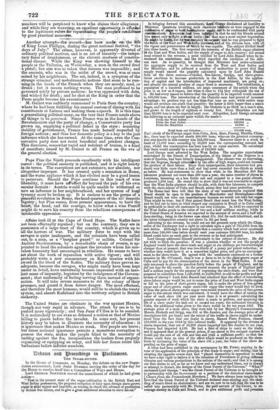Another attempt-.-tha seventh—has been made on the lea of King
Louis Philippe, during the great national festival, " the days of July." The crime, however, is apparently divested of ordinary political motives, and is an act of insanity—the tempo- rary furor of drunkenness, or the chronic madness of constitu- tional disease. While the King was showing himself to the people at the Tuileries, on Wednesday, a man in the crowd fired -a pistol ; but aim was so taken that success was impossible ' - and -the assassin, who was in the midst of the crowd, was at once seised by his neighbours. The act, indeed, is a symptom of the strange criminal and melodramatic notions that seem to be run- 'ning m the heads of the French when they are moody, mad, or drunk ; but it means nothing worse. The man professed to be governed solely by private motives : he was oppressed with debt,
and wished for death; he shot at the King in order that the Peers might become ds executioners !
• M. Guizot was suddenly summoned to Paris from the country; where he had been fulfilling his annual custom of dining with his 'constituents at Lisieux and making them a speech. It is this time a generalizing political essay, on the text that France needs abOve all things to be governed. Since France was in the hands of the Revolutionists and the party of change, a Conservative party has grown up, supplying a political defect in the state : acquiring stability of government, France has made herself respected. by
'
-foreign nations and thus her domestic policy is a key to the just influence which she has earned. At the same time, even the Con- servative party does not resist beneficial and prudent changes. This discourse, somewhat vapid and redolent of truism, is a kind of manifesto issued by M. Guizot to all France on the eve of the general election.


























 Previous page
Previous page